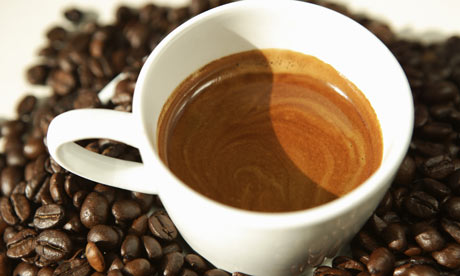My previous blog entries are at:
-
Drinking coffee could help to prevent the neural degeneration - 27th May and
-
Caffeine can cause Hallucinations - 1st June
• Data shows coffee addicts only stave off caffeine withdrawal
• Stick with coffee or keep off it altogether, concludes study
- Jacob Aron
- guardian.co.uk, Wednesday 2 June 2010 14.55 BST
- Article history
Coffee drinkers may think they're getting a caffeine boost, but they're no more alert than people who never drink the stuff. Photograph: Getty
The millions of people who depend on a shot of coffee to kickstart their day are no more alert than those who are not regular coffee drinkers, say researchers.
A cup of coffee, suggests a study, only counteracts the effects of caffeine withdrawal that has built up overnight.
"Someone who consumes caffeine regularly when they're at work but not at weekends runs the risk of feeling a bit rubbish by Sunday," said Peter Rogers, who led the research at Bristol University. "It's better to stick with it or keep off it altogether."
Infrequent coffee drinkers who reach for an emergency hit fare no better, experiencing heightened feelings of anxiety - and withdrawal symptoms the next day.
How genetic differences may influence response was also examined. Blood samples were taken from 379 volunteers who were asked to avoid caffeine for 16 hours.
After that period, they were given either a caffeine pill or a placebo. Later, they took a slightly higher dose or another placebo.The researchers then used a standard questionnaire called the Mood, Alertness and Physical Sensations Scales (MAPSS) to measure the subjects' emotional state and alertness.
The participants' response to caffeine depended on their normal consumption. Roughly half regularly used medium-to-high levels of caffeine – equivalent to a few mugs of filter coffee a day – while the rest usually had little or no caffeine at all.
Caffeine did not increase the alertness of any group above the levels of non-users who were given the placebo. But caffeine fiends who were given a placebo after abstaining from coffee for 16 hours felt less alert and experienced worse headaches than those who received their usual dose. Four people had to drop out of the study owing to the severity of their headaches.
Infrequent users had more headaches after taking the caffeine pills, but did not feel any more alert than normal.
Among people who usually consumed little or no caffeine, a dose boosted their anxiety levels. Those participants who had a variant of a gene called ADORA2A, which has been linked to panic attacks, became particularly anxious after a dose of caffeine.
Medium-to-high level caffeine users, however, did not become any more anxious after caffeine, implying that regular consumption helps build up a resistance to its anxiety-inducing effect.
People in this group who were genetically predisposed to anxiety drank more coffee than the rest, suggesting mild feelings of tension might even contribute to their enjoyment of the caffeine buzz.
The research is significant because previous studies into the effects of caffeine have involved far fewer participants.
"It's an interesting piece of evidence, and a very ambitious study," said Lorenzo Stafford, a psychologist at the University of Portsmouth. "Getting the DNA samples of so many participants is a huge effort."
The study was published today in the journal Neuropsychopharmacology.

No comments:
Post a Comment